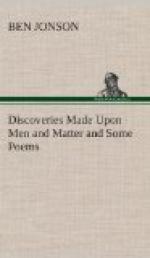EPITAPH ON ELIZABETH, L. H.
Wouldst thou hear what man can say
In a little? Reader, stay.
Underneath this stone doth lie
As much beauty as could die
Which in life did harbour give
To more virtue than doth live.
If, at all, she had a fault
Leave it buried in this vault.
One name was Elizabeth,
The other let it sleep with death.
Fitter, where it died, to tell,
Than that it lived at all. Farewell.
EPITAPH ON THE COUNTESS OF PEMBROKE
Underneath this sable hearse
Lies the subject of all verse,
Sidney’s sister, Pembroke’s mother:
Death! ere thou hast slain another,
Learned, and fair, and good as she,
Time shall throw a dart at thee.
TO THE MEMORY OF MY BELOVED MASTER WILLIAM SHAKSPEARE, AND WHAT HE HATH LEFT US
To draw no envy, Shakspeare, on thy name,
Am I thus ample to thy book and fame;
While I confess thy writings to be such,
As neither man, nor muse can praise too much.
’Tis true, and all men’s suffrage.
But these ways
Were not the paths I meant unto thy praise;
For silliest ignorance on these may light,
Which, when it sounds at best, but echoes right;
Or blind affection, which doth ne’er advance
The truth, but gropes, and urgeth all by chance;
Or crafty malice might pretend this praise,
And think to ruin, where it seemed to raise.
These are, as some infamous bawd, or whore,
Should praise a matron; what would hurt her more?
But thou art proof against them, and, indeed,
Above the ill-fortune of them, or the need.
I, therefore, will begin: Soul of the age!
The applause! delight! and wonder of our stage!
My Shakspeare rise! I will not lodge thee by
Chaucer, or Spenser, or bid Beaumont lie
A little further off, to make thee room:
Thou art a monument without a tomb,
And art alive still, while thy book doth live
And we have wits to read, and praise to give.
That I not mix thee so, my brain excuses,
I mean with great, but disproportioned Muses;
For if I thought my judgment were of years,
I should commit thee surely with thy peers,
And tell how far thou didst our Lily outshine,
Or sporting Kyd, or Marlow’s mighty line.
And though thou hadst small Latin and less Greek,
From thence to honour thee, I will not seek
For names: but call forth thundering Eschylus,
Euripides, and Sophocles to us,
Pacuvius, Accius, him of Cordoua dead,
To live again, to hear thy buskin tread,
And shake a stage; or, when thy socks were on,
Leave thee alone for the comparison
Of all that insolent Greece, or haughty Rome
Sent forth, or since did from their ashes come.
Triumph, my Britain, thou hast one to show,
To whom all scenes of Europe homage owe.




